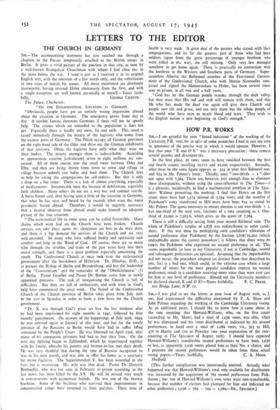Stu,—I was glad to see the letters in your issue
of August loth, as I, too, had experienced the difficulties mentioned by P. A. Shaw and John Palmer regarding the working of the Cambridge University voting. As an additional point, I should like to know how it came about in the vote counting that Howard-Williams, who, on the first count (according to Mr. Shaw), had a total of 1,036 votes, was able, when he was eliminated and his votes distributed as indicated by his second preferences, to hand over a total of 1,089 votes, viz., 503 to Hill, 476 to Harris and 'to to Priestley (see your explanation of the vote- counting in The Spectator of August ioth). I should have expected Howard-Williams's transferable second preferences to have been 1,036 or less, as apparently 1,036 voters placed him as their No. I choice, and I presume the second preferences would be taken from these actual [This further complication was intentionally omitted. Actually what happened was that Howard-Williams's total vote available for distribution was increased by the acquisition of 762 second preferences from Pick- thome ; but 709 of Howard-Williams's own votes were non-transferable, because that number of electors had plumped for him and indicated no other preference; 1,036 + 762 — 709 = 1,089.—ED., Spectator.]


























 Previous page
Previous page